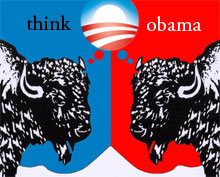 I never stop thinking about the Obama campaign these days, but I sometimes do stop writing about it. I took an end of week break starting Friday. I'm not sure that pause is over, but I do have a few things to say as Q3 fund-raising comes to a close tonight.
I never stop thinking about the Obama campaign these days, but I sometimes do stop writing about it. I took an end of week break starting Friday. I'm not sure that pause is over, but I do have a few things to say as Q3 fund-raising comes to a close tonight.1. Last Week
The first is what I was up to last week. I alluded to working feverishly after Monday night's event to put something together. Well, it begins with the buffalo heads above. That's a preview of what's to come around here. Something other than words. Yup.
This is not an unveiling -- the pensive buffaloes above are my own esoteric handiwork -- but the real goods are soon to come. With the help of a talented friend, and the input of a few other generous pals of mine, a mini-campaign was put together last week. I have a full-blown, print-ready couple of sloganeering designs set to go.
The campaign to come is going to focus on promoting agility and opportunity, as well as some specific ideas: connecting the youth vote with seniors (GenerationS Obama, anyone? Building intergenerational relationships to court older voters and ensure turnout by younger ones...), pushing harder in local diasporic populations and fighting countrywide for endorsements from our elected representatives at every level.
2. Big and Small
I'm talking campaign concerns here.
I haven't heard back yet about my "why no signs?" inquiry on Thursday. Fortunately, I was not promised to expect an answer immediately by the Obama volunteer at the HQ number. It might be nice to have a speedier answer, but it makes all the difference that someone was trained well enough to be helpful without overpromising.
Of somewhat greater concern are a couple of emails that I've received from one of the NYC volunteer groups. Apparently, the deadline for independent voters (or registered Republicans who've caught the fever) to switch party affiliations in order to vote in the February 5 Democratic primary here is October 12. Someone checked the data and found a huge number of independents statewide -- enough to make a big difference in the contest between Barack and Hillary.
I'm glad that the word is getting out and that people are talking about how to make a public plea for Obama-leaning independents to walk in Democratic shoes for a few miles, but this seems like a big miss by the campaign. This is exactly the sort of issue that NYC volunteers could have been pushing for the last seven months. Given the way independent votes are likely to fall, it would have made sense to have a systematic campaign to recruit one-time, "Obama Democrats" for the primary vote earlier in the year.
I realize that it's my duty to pitch in and figure out how to make the most of the next 12 days, rather than beginning a postmortem. I'd just like to cite this as one concrete example of why it makes sense for creative people to start thinking ahead and acting, NOT just to wait for direction from HQ. I think I've spent the last month making this case to myself, hoping secretly that I'd be proven wrong, but I'm done with that. Complimentary efforts can only help the cause.
3. Good News
The good news as of tonight's email box is that Barack has gotten a bump in Iowa. According to a Newsweek story cited in an email and available on BarackObama.com, Obama holds a small lead over Hillary among likely caucus-goers. Granted, the margin of error given the sample size basically has the potential to eradicate any candidate's lead in this particular survey, but the Obama ahead spin is coming from Newsweek, not just Obama's guy, David Plouffe. In that sense, the data means less than the fact that one major media outlet is refraining from the "presumptive winner" line for at least a week.
4. The MONEY
Also, the campaign hit its mark for donors and donations. Before the deadline hit, they'd already crossed the 350,000 donor mark and claimed to have received more than 500,000 donations, as well. This will not win the race, but it's not definitely not bad news. Before signing on here, I anted up another $10 (freelance writer=big spender) to flip the counter just a little bit higher.
5. URL Hiccup Ahead
Finally, and this really ought not be at the bottom of this post, I will be redirecting the www.thinkobama.com domain in the next day or two. I know I have readers of different ages and levels of comfort online, so it's hard to know what level of detail is helpful to communicate. I just want to advise you not to be worried if you have any trouble bringing up the site this week.
For anyone using thinkobama.com to get here, there may be a day or two of oddities. I hope not. If you have any trouble, you can always get here directly, using http://thinkobama.blogspot.com in your browser.
Once the transfer is complete, there may be more to this place than just a blog. The end of this year promises to be a wild political ride.








posted 05:07 pm on 09/18/2007